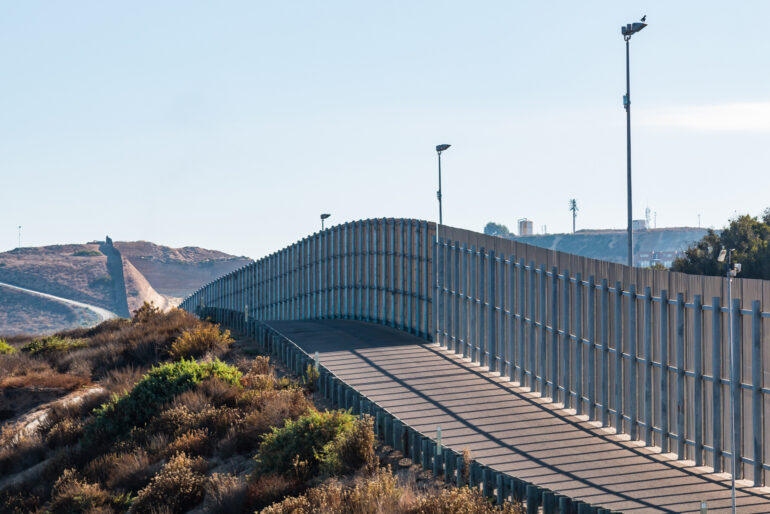The news from the border has been bleaker than ever — children as young as 4 months old are being separated from their parents and housed in what some say are effectively concentration camps, where even basic toiletries are in short supply. If this situation makes you sick, sad, and scared, you’re not alone. But you’re also in a position of power to help — here are five tangible ways you can make a difference.
1. Call your officials
This can feel stymying, because it’s hard to be eloquent and forceful on the phone when you are overwhelmed and upset. Write yourself a little script, if you want, and then dial. Tell your reps that you want them to “seek and publicly report information about the facilities housed or planned in your state.” Organizations such as 5Calls can help you get informed on how to call and what to say — remember that information is power, and when reps get inundated with calls, it tends to make the news. PS: Feel free to call your reps about other things that are important to you, right down to your local government.
2. Find a rally
Never underestimate the power of committed people in large groups (Women’s March, anyone?). If you can spare a few hours, join up with the Immigrant Justice Group. You can find a local Families Belong Together rally and maybe help someone get informed about the crisis at the border. You can also take part in Lights for Liberty, a nationwide vigil on July 12 at 9 p.m. local time. Locations for the vigil include:
- El Paso: where migrants are being housed “partially outdoors” near a bridge with no running water for months at a time;
- Homestead, Florida: where a migrant children’s detention facility has been charged with rampant abuse and neglect;
- San Diego: near the point of entry border crossing from Tijuana, Mexico;
- New York City: where deportation rates have increased by 150 percent between 2016 and 2018;
- Washington, D.C. (in front of the Capitol building): to demand action from Congress.
3. Study up for 2020
The election might feel far away, but it’s much closer than you think. Make sure to do your research for every office — local positions included. Who is running for senate or congress in your state? Do you know their stance on immigration? What about your local judges? Do you elect a sheriff? Take the time to do some research on people — what you learn may surprise you. You can also read more extensively about the 2020 democratic presidential candidates’ opinions and start thinking about how you’ll cast your ballot in just over a year.
4. Donate your time
If you’re a lawyer, or a translator, or just want to get involved, there are ways to do that. In fact, The Young Center for Immigrant Children’s Rights is located in Chicago — you can become a children’s advocate in many cities across America and you can spend time with a child and advocate for them as they go through the myriad legal processes. You can also contact your local branch of the ACLU to see what boots-on-the-ground action they are taking. If you’re in a border state, or can travel to one, so much the better: the Texas Civil Rights Project is in need of volunteers who speak Spanish and/or indigenous languages such as Mam, Q’eqchi’, or K’iche’ and have legal experience to help and interview families. The Immigrant Children’s Assistance Project is also looking for volunteers with a legal background to assist with “Know Your Rights” presentations for asylum seekers in Texas.
5. Donate your money
This is the obvious one, and the easiest way for most of us to feel involved. While major organizations like the ACLU are important, there are a number of smaller nonprofits that are making a more tangible difference at the border. Here are just a handful:
- American Immigration Council: This organization works directly at detention centers, helping families by documenting conditions of detention and bringing lawsuits to challenge them
- Asylum Seeker Advocacy Project: Provides “emergency legal aid to refugee families.”
- South Texas Pro Bono Asylum Representation Project (ProBAR): Working jointly with the American Bar Association, the State Bar of Texas and the American Immigration Lawyers Association have banded together to provide pro bono legal services to asylum seekers detained in South Texas by the United States government.
- Refugee and Immigrant Center for Education and Legal Services (RAICES): A nonprofit that aims to reunite families and help kids feel safe, this Texas-based organization works to “directly fund the bond necessary to get parents out of detention and reunited with their children while awaiting court proceedings” and make sure that every child in the Texas immigration courts has legal representation.
View this post on Instagram
 Jessica Suss is a native Chicagoan residing in Washington, D.C. She is currently getting her master’s degree in secondary English education at the University of Maryland. She enjoys petting other people’s dogs and is faithful to Lou Malnati’s alone. Jessica is also a supporter of MAZON and No Kid Hungry.
Jessica Suss is a native Chicagoan residing in Washington, D.C. She is currently getting her master’s degree in secondary English education at the University of Maryland. She enjoys petting other people’s dogs and is faithful to Lou Malnati’s alone. Jessica is also a supporter of MAZON and No Kid Hungry.

